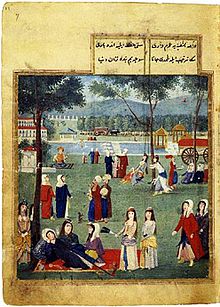Enderûnlu Fâzıl
Enderûnlu Hüseyin Fâzıl Bey ( Ottoman حسين فاضل بك اندرونى Hüseyin Fâzıl Bey Enderûnî ; * around 1757 in Acre ; † December 1810 in Istanbul ) was an Ottoman Dīwān and Masnawī poet and satirist .
Fâzıl Bey, who openly dealt with his homosexuality , gained notoriety through his posthumously published erotic works , including the Zenannâme, which he reluctantly wrote at the insistence of his lover and was the first forbidden in the Ottoman Empire /زناننامه / 'Book of Women', in which he describes the advantages and disadvantages of women from different nations.
Life
Fâzıl Bey was a grandson of Zahir Ömer and son of Ali Tâhir, who rebelled against the Sublime Porte and were killed in 1775 and 1776 respectively. After the death of his father, Fâzıl Bey went to Istanbul , where he attended the Enderun Palace School ( Enderûn-i Hümâyûn /اندرون همايون) has been recorded. In 1783 he was fired from school when same-sex intrigues became known. In 1799 he was exiled to Rhodes because of satirical writings and only returned after he lost his sight. Fâzıl Bey spent the rest of his life in a sick bed; his grave is in Eyup .
Works
- Divan /ديوان.
- Defter-i Aşk /دفتر عشق / 'Book of Love'.
- Hûbannâme /خوباننامه / 'Book of the beautiful [men]'.
- Zenannâme /زناننامه / 'Book of Women'.
- Çenginâme /چنگينامه / 'Book of Male Dancers'.
literature
- Enderunlu Fâzıl. In: Türkiye Diyanet Vakfı İslâm Ansiklopedisi . Volume 11. TDV Yayını, Istanbul 1995 (Turkish).
- JH Mordtmann: Fāḍıl Bey. In: The Encyclopaedia of Islam. New Edition . Volume 2. Brill, Leiden, p. 727 f. (English).
| personal data | |
|---|---|
| SURNAME | Enderûnlu Fâzıl |
| ALTERNATIVE NAMES | Hüseyin Fâzıl Bey Enderûnî (full name) |
| BRIEF DESCRIPTION | Ottoman divan and masnawī poet, satirist |
| DATE OF BIRTH | around 1757 |
| PLACE OF BIRTH | Acre |
| DATE OF DEATH | December 1810 |
| Place of death | Istanbul |
